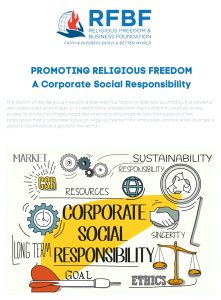by Kent Johnson, J.D., Senior Corporate Advisor, Religious Freedom & Business Foundation
Part of the blog series, Authenticity & Connection
The launch of the Religious Freedom & Business Foundation in 2014 was spurred by a powerful, well-researched White Paper entitled “Promoting Religious Freedom: A Corporate Social Responsibility.” In it, researchers affiliated with the new foundation cited many studies and highly regarded international standards in support of the proposition that a corporate focus on religious freedom (for employees and societies at large) is good for business and good for the world. Since then, the evidence supporting this CSR call to action has grown even more compelling.
This blog isn’t the right place to update the scholarly research. Instead, I’ll provide a few personal vignettes to illustrate some of the foundational findings from that White Paper.
First, let me share why the particular CSR cause of freedom of religion and belief (FoRB) is important to a lawyer like me. To my thinking, a healthy, ethical corporate culture must rest on more than written codes and compliance mechanisms. What’s needed is a connection with employees’ hearts – the core values and beliefs that govern what they do when nobody’s looking. From whence does a worker draw courage to raise questions about safety, or about compliance with ethical standards, when it seems the pressure is predominantly on short-term profitability? Why draw attention to the fact that a supplier uses slave labor, or pollutes the environment, or discriminates against a group of people? What impels employees to humbly acknowledge their own mistakes, or to re-direct credit to someone else for a job well done? What motivates a worker to care about people of another race, nationality, sexual orientation, culture, religion or belief? Why would one visit a diverse coworker in the hospital, or take the time to improve healthcare measures in a developing country?
 The answer is that what motivates people to do these kinds of things is their faith, or their core belief (whether they identify as “religious” or not). Their ultimate “WHY” is what impels employees to embrace social responsibility. Helping employees connect with their ultimate “WHY” at work promotes CSR. What’s more, companies that actively promote FoRB in countries throughout the world will advance the cause of civility. It’s good for business and good for the world.
The answer is that what motivates people to do these kinds of things is their faith, or their core belief (whether they identify as “religious” or not). Their ultimate “WHY” is what impels employees to embrace social responsibility. Helping employees connect with their ultimate “WHY” at work promotes CSR. What’s more, companies that actively promote FoRB in countries throughout the world will advance the cause of civility. It’s good for business and good for the world.
Recent research and events of the Religious Freedom and Business Foundation have illustrated the strong and growing support of freedom of religion from industry leaders like Intel, Texas Instruments, Salesforce, and others identified in the Foundation’s REDI Index It’s clear: More and more companies are opening doors to religious expression, worship, prayer, religious mentoring and cross-faith celebrations and events in the workplace. And real-life stories of the positive effects of such openings are spreading widely. Here are a few of my personal experiences, illustrating how this focus on freedom impacts the world.
I’ve seen Jews, Muslims, Christians, Bahai, Sikhs, Buddhists, and Hindus eagerly learning about one another’s core principles and beliefs. I’ve known recruits who joined and stayed at companies because they provide an atmosphere where employees can live out their faith openly, and not “under cover;” where they can feel free to speak of what defines who they really are. I’ve seen atheists relishing the fact that they can “come out of the closet” and let others know of their core values and perspectives. I’ve seen a custodian quietly praying together with an executive over a personal loss; and insightful business mentoring rooted in rigorous study of the sacred writings of various religions. I’ve experienced stirring worship, prayer and scripture study taking place in workplaces, open to every person regardless of background or inclination. When layoffs became necessary, I’ve seen people of various faiths draw such strength from their beliefs that they became comforters to their bosses – the ones who were tasked with delivering the bad news. Between LGBTQ people and advocates of traditional faiths, I’ve seen unwarranted walls of distrust and fear supplanted by deep respect; kindness and admiration. And tears of joy as people are acknowledged for who they truly are. Collegial alliances in service to the needy, among people across faith divides. And bonding laughter. Lots of bonding laughter.
This is transformational stuff.
And it’s not a leap to conclude that these kinds of transformational experiences impact the entire world. The employees I’ve referenced hail from countries like China, Saudi Arabia, Pakistan, Vietnam, Africa, Russia… And they engage with buyers, suppliers and co-venturers all over the planet. The fact is, companies that seek to advance FoRB in all their spheres of influence business are making a difference.
It’s clear: Freedom of Religion is a worthy part of our companies’ Corporate Social Responsibility efforts. Embrace it; and watch your company transform the world for good.

